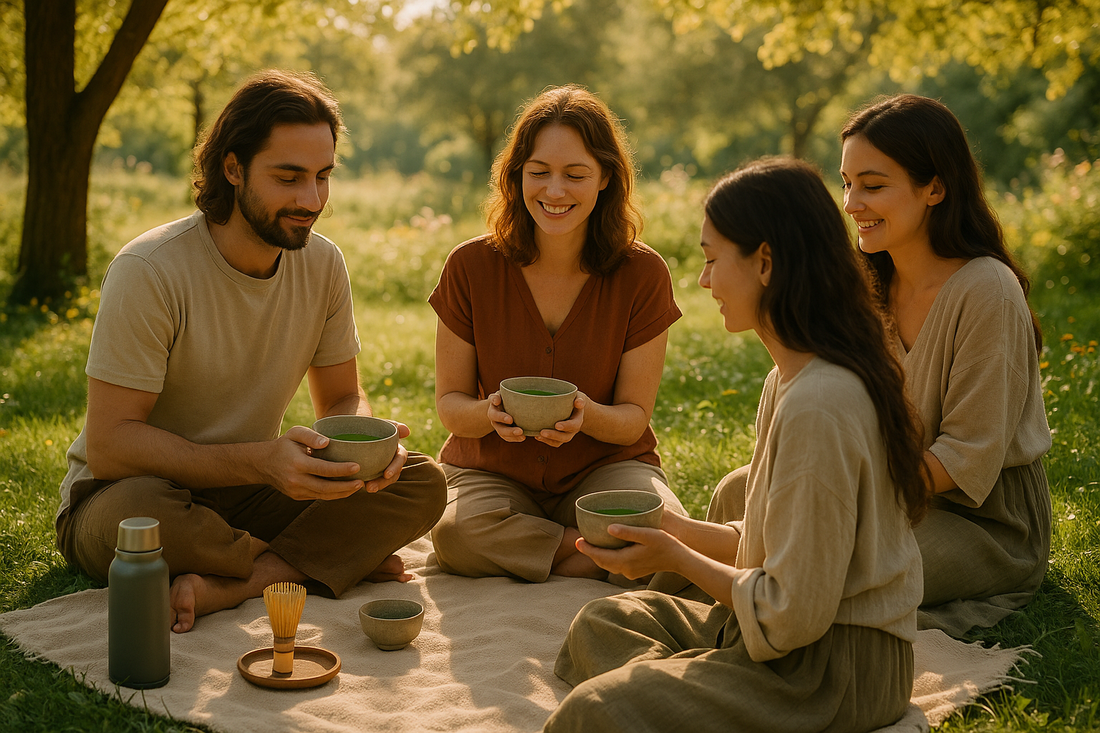
Our lives are busier and more digital than ever. Finding time to step outside and connect with others is both a luxury and a necessity. Research shows that spending time in green spaces and fostering social connection can profoundly impact physical and mental health. This post explains why nature matters, how social ties support longevity, and offers a simple weekend ritual that brings it all together with a House of Matcha oat latte.
Why nature matters
Modern life often keeps us indoors, but our brains evolved outdoors and still respond positively to natural environments. The American Heart Association notes that spending 120 minutes a week in nature improves health and well‑being[1]. Even a stroll in the woods can lift mood, and just seeing greenery from a hospital window helps patients feel better[1]. Nature’s gentle scenes calm the nervous system: walking through a meadow or forest reduces depression and anxiety and restores mental abilities like short‑term memory and spatial processing[1]. A 90‑minute walk in nature has been shown to lower activity in parts of the brain linked to negative rumination, helping you break cycles of worry[1]. Outdoor workouts also decrease anxiety more effectively than indoor exercise and energise mind and body[1]. Natural settings even spark creativity—one study found that spending four days in nature improved problem‑solving skills by 50%[1].
Build community in green spaces
Being outdoors is only part of the equation; our well‑being is also shaped by our relationships. Harvard’s public health faculty emphasise that social connection helps people live longer and healthier lives, while loneliness is associated with higher risk of heart disease, stroke, anxiety, depression and dementiahsph.harvard.edu. In fact, loneliness and social isolation increase the risk of premature death by 26–29%hsph.harvard.edu. Community activities—such as walking groups, cooking classes and volunteering—are effective tools in what public‑health experts call “social prescribing,” a practice that refers patients to community resources to combat lonelinesshsph.harvard.edu. A World Health Organization report highlights that one in six people worldwide experiences loneliness, which contributes to 100 deaths every hour, and that strong social connections lead to better health and longer lifewho.int. The takeaway: time in nature combined with meaningful social interaction supports both body and mind.
A weekend ritual to try
Create a ritual that combines the restorative power of green spaces with the warmth of community. Choose a nearby park, beach or bush track—ideally somewhere you can spend at least two hours outdoors each week[1]. Invite a friend or neighbour to join you (the company of even one person can ease feelings of isolationhsph.harvard.edu). Bring a blanket, a journal and chilled House of Matcha oat lattes in a cooler. Start with a slow walk or gentle yoga stretches under the trees. When you find a shady spot, sip your matcha, practise a few cycles of exhale‑focused breathing and jot down thoughts or gratitudes. Use this time to talk about how you’ve been feeling and to listen deeply to your companion. Research suggests that nature fosters prosocial behaviours like generosity and empathy, so sharing the experience may strengthen your bond[2]. You’ll return home refreshed, centred and more connected—both to the environment and to those around you.
Prosocial benefits and belonging
Natural beauty doesn’t just make us feel good—it encourages us to act kindly. AHA’s Healthy for Good campaign notes that exposure to nature increases prosocial behaviours like generosity and empathy and instils a sense of belonging to the wider world that is vital for mental health[2]. When you gather friends or family for a matcha picnic or coastal clean‑up, you reinforce this sense of community. Over time, these shared rituals become part of your identity, helping you feel rooted and supported.
Join the House of Matcha community
At House of Matcha we believe wellness is amplified when it’s shared. Throughout the year we’ll host guided walks, beach clean‑ups and matcha picnics along Australia’s east coast. Sign up for our newsletter or follow us on social media to get involved. When you post about your own nature rituals, tag us so we can celebrate your journey. Together, we can build a community that honours both personal health and the planet.
References
-
The American Heart Association explains that spending 120 minutes per week in nature improves health and well‑being, that walking through green spaces reduces depression and anxiety, and that a 90‑minute nature walk lowers activity in brain regions associated with negative rumination. It also notes that time in nature restores mental abilities like short‑term memory, enhances creativity (four days outdoors improved problem‑solving by 50%) and produces greater anxiety reduction during outdoor workouts compared with indoor exercise.
-
The same article reports that exposure to nature encourages prosocial behaviours such as generosity and empathy and creates a sense of belonging to the wider world, contributing to mental health.
-
Harvard researchers say that social connection helps people live longer and healthier lives, whereas loneliness is linked to higher risk of heart disease, stroke, anxiety, depression and dementia hsph.harvard.edu. Social isolation increases the risk of premature death by 26–29% hsph.harvard.edu.
-
Social prescribing—referring patients to community activities like walking groups and volunteering—is highlighted by Harvard experts as a way to combat loneliness and improve well‑being hsph.harvard.edu.
-
A World Health Organisation report notes that one in six people worldwide experiences loneliness and that loneliness is associated with 100 deaths per hour; it also states that strong social connections lead to better health and longer life who.int.